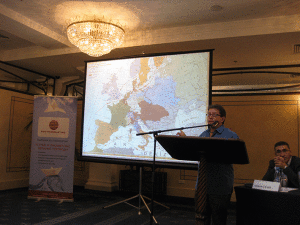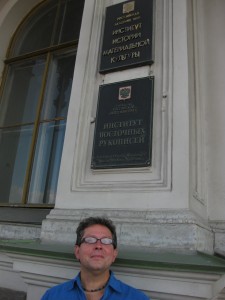On July 25, Associate Professor of History and American Studies Nabil Al-Tikriti presented a paper entitled “John Elphinstone and the Battle of Çeşme” to the Second International Congress of Maritime Studies, which took place on July 23-25 in St. Petersburg, Russia. The Congress, which featured international scholars presenting some 115 papers primarily relevant to Russian Maritime History, was hosted by the Lichnost Peterburga Historical and Cultural Center. Co-organizers included Piri Reis Üniversitesi and the International Association of Maritime Studies (IAMS). Invited by the IAMS conference organizers for the third time in as many years, Al-Tikriti described the overall Mediterranean campaign undertaken by the Russian fleet as part of the 1768-1774 Russo-Ottoman war, the legacies of that war, the role played by the Scottish captain John Elphinstone and other major players, and the materials held in the Elphinstone papers collection at Princeton University. Organizers plan to complete an edited volume of conference presentations in the months to come.
In the course of his trip, Al-Tikriti also visited Helsinki and Istanbul, where he discussed potential international study opportunities with certain Turkish academics. In addition, he visited the Russia Academy of Science’s Institute of Oriental Manuscripts, where he researched an Ottoman divan poetry collection relevant to his research agenda on early modern Ottoman intellectual history. To prepare for this presentation, Al-Tikriti also conducted two days of research at Princeton’s Rare Books Collection in June 2014.
Here is Al-Tikriti’s paper abstract for the Congress:
“In July 1770, the Russian Baltic Sea fleet defeated an Ottoman fleet in the Aegean Sea between the coast of Çeşme and the island of Chios. The Russian side was supported by Greek fighters who might be classified as proto-nationalist leaders, and was partially commanded by an English mercenary named John Elphinstone. The Ottoman side was commanded by an eccentric Georgian admiral named Cezayırlı Hasan Paşa who won a modicum of fame for his love of domesticated lions.
This battle took place as part of the 1768-1774 Russo-Ottoman war, a decisive Russian victory which transferred parts of the Northern Caucasus, Crimea, and Southern Ukraine from Ottoman to Romanov control. The war ended with the 1774 Treaty of Küçük Kaynarca, which scholars have long considered a turning point in Ottoman diplomatic history, largely because the two signatory empires traded protector status, with the Russians claiming that status over Ottoman Orthodox Christians and the Ottomans claiming the same status over Russia’s Muslim populations.
In my presentation, I intend to examine the role that John Elphinstone played in these events by summarizing and analyzing his memoirs. His papers, which are held within Princeton University’s rare books collection, should provide great insight into the diplomatic, military, and political intrigues surrounding the war in general, and the Battle of Çeşme in particular. More broadly, I intend to explore some of the larger legacies of this war on Russian-Ottoman relations, the progressive expansion of Russian sovereignty southwards in the 18th-19th centuries, and the contemporary relevance of these events to the international relations of Eastern Europe and the Black Sea region.”
This trip was made possible with the support of the conference organizers, a CAS supplemental grant and a CAS faculty development (research) grant. However, due to CAS budget limitations, these presentations, discussions, and research visits were also partially self-financed.

